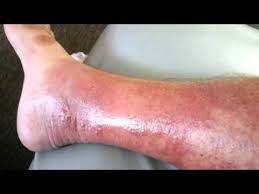Humans acquire this illness by eating reef fish containing the naturally occurring toxins, ciguatoxins. The  toxin is transferred through the food chain as the algae is consumed by herbivorous fish, which are consumed by carnivorous fish, which are in turn consumed by humans. These toxins become progressively concentrated as they move up the food chain from small fish to large fish that eat them, and reach particularly high concentrations in large predatory tropical reef fish. Fish known to carry Ciguatoxin are: grouper, snapper – red, blackfin, cubera and dog, amberjack, barracuda, hogfish, Kingfish, moray eel and sturgeon.
toxin is transferred through the food chain as the algae is consumed by herbivorous fish, which are consumed by carnivorous fish, which are in turn consumed by humans. These toxins become progressively concentrated as they move up the food chain from small fish to large fish that eat them, and reach particularly high concentrations in large predatory tropical reef fish. Fish known to carry Ciguatoxin are: grouper, snapper – red, blackfin, cubera and dog, amberjack, barracuda, hogfish, Kingfish, moray eel and sturgeon.
 Annually, 15,000 – 50,000 people report cases of CFP. Ciguatoxin (CTX) is one of the most potent natural substances known. And it is difficult to prevent because CTX in fish is odorless and tasteless, and toxic fish cannot be identified by appearance or behavior. CTX is heat-stable, and therefore, cooking, boiling, freezing, baking or frying does not eliminate or destroy the toxin from the fish tissue. Prevention of CFP relies on the individual’s avoidance of fish that have a greater likelihood of containing CTX.
Annually, 15,000 – 50,000 people report cases of CFP. Ciguatoxin (CTX) is one of the most potent natural substances known. And it is difficult to prevent because CTX in fish is odorless and tasteless, and toxic fish cannot be identified by appearance or behavior. CTX is heat-stable, and therefore, cooking, boiling, freezing, baking or frying does not eliminate or destroy the toxin from the fish tissue. Prevention of CFP relies on the individual’s avoidance of fish that have a greater likelihood of containing CTX.
CFP can produce countless gastrointestinal and neurologic symptoms which last days to weeks, or even months. Gastrointestinal symptoms include vomiting, diarrhea, abdominal pain, and nausea which can develop within 6–24 hours of eating reef fish.
Neurologic symptoms vary among patients and include the following: paresthesias (numbness and tingling) in the extremities (feet and hands) and oral region, generalized pruritis (itching), myalgia (muscle pain), arthralgia (joint pain), and fatigue. A distinctive symptom reported by many patients is an alteration or “reversal” of hot/cold temperature perception, in which cold surfaces are perceived as hot to the patient, or produce dysesthesia (unpleasant, abnormal sensation). These symptoms can last from a few days to several weeks.
CFP diagnosis is based on the presenting symptoms and time course, the history of having eaten a reef fish, and importantly, the exclusion of other diagnoses that could account for the symptoms. Other than supportive care there are few specific treatments for CFP.
Source: US National Library of Medicine
